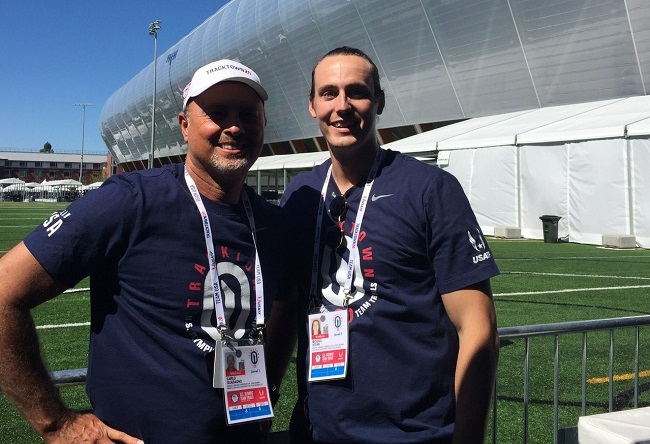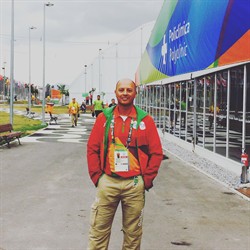Like the athletes who train for years to make it to the 2022 Winter Olympics in Beijing, the process to become a member of their elite medical staff can be just as selective and competitive.
NUHS Florida faculty Carlo Guadagno, DC, DACBSP®, ICSC, FICC, who has participated on the medical staff of numerous Olympic qualifying events, including the 2016 Olympic Games in Rio de Janiero, understands what it takes to work alongside the world’s top athletes. Most recently, Guadagno alongside Michael Stern, a student in the chiropractic medicine program, served as members of the medical staff for the USA Track and Field Olympic Trials last year in Eugene, Oregon. Guadagno also served as a provider to the USA bobsleigh and skeleton team as they prepared to compete for medals at this year’s Winter Olympics in Beijing during their World Cup Tour stop in Sigulda, Latvia.
According to Guadagno, chiropractors play a crucial role in helping athletes achieve that extra edge it takes to win gold. Sometimes all it takes is being a thousandth of a second faster or being able to jump a hundredth of an inch higher.
“In addition to several years of experience, you have to be a jack of all trades,” Dr. Guadagno said. “One of the key ingredients that makes chiropractors so desirable to athletes is that we can assist in the field, on the court, on the greens, on the sidelines; the only tools needed may just be our hands.”
If working at the Olympic Games is an eventual career goal of yours, Dr. Guadagno shares 5 tips students can practice early on to help them get there.
1. Get involved with chiropractic sports organizations
No matter where you live, there exists local, national and international chiropractic sports organizations that students can join. Not only are these organizations helpful for networking, they also keep their members abreast of educational opportunities.
The International Federation of Sports Chiropractic along with the American Chiropractic Association (ACA) Sports Council, and the American Chiropractic Board of Sports Physicians are organizations that are in the DNA of the chiropractic medical staff of top athletic organizations.
 NUHS Florida faculty Carlo Guadagno, DC, CCSP®, ICSC, FICC, poses outside the Olympic Village Polyclinic at the 2016 Olympic Games in Rio de Janeiro, where he served as part of the multidisciplinary sports medicine staff.
NUHS Florida faculty Carlo Guadagno, DC, CCSP®, ICSC, FICC, poses outside the Olympic Village Polyclinic at the 2016 Olympic Games in Rio de Janeiro, where he served as part of the multidisciplinary sports medicine staff.
For various events, including the Olympic trials, students that are affiliated with these organizations are frequently invited to help with important tasks like data collecting for research, performing intake at the medical tent and assisting with encounter documentation for athletes. These opportunities are crucial in helping students get a taste of what it’s like working at sporting events all over the world. They’re also a great place to network. According to Dr. Guadagno, seeking leadership positions within these organizations can help you stand out, as well.
2. Have a wide range of skills, including emergency medicine
Chiropractors help athletes with a number of issues ranging from emergent situations to performance enhancement, and many a musculoskeletal ailment. As a result, sports chiropractors require a wide range of skills.
“Sports chiropractors must know many techniques. Depending on the situation, a variety of chiropractic techniques may be utilized,” Dr. Guadagno said.
Sports chiropractic isn’t about just treating the spine or providing an adjustment. Sometimes what’s needed is soft tissue work. Unlike working in a chiropractic clinic, the sports medical staff are also expected to be fluent in emergency medicine. If there’s an injury during a game or competition, sport chiropractors might have to perform an examination on the sidelines. This could mean helping a runner who collapses at the finish line or determining if a boxer is able to continue a fight after a concussion. They might also have to assist with spine boarding a suspected spinal injury or perform lifesaving CPR.
At NUHS, students can gain these valuable skills in the ambulatory trauma class. Emergency medicine is also taught in NUHS’s sports medicine class.
3. Be prepared to perform duties outside of providing medical care
Working at the Olympic Games might not just require providing medical care. At the Olympic Games, Dr. Guadagno said you may also be tasked with doing other duties like escorting athletes through the anti-doping program or helping to make sure that minor athletes are being taken care of appropriately.
“As an officer of the Olympic committees, there are ideals that have to be followed,” he said.
Being a part of sports medical teams could also require ensuring that events are well-staffed and that there is an ambulance on stand-by in case of emergency.
4. Gain as much experience as possible
Becoming a part of the medical staff at the Olympic Games is no easy feat.
“It’s a common dream but it may take quite a while and a lot of volunteer work,” Dr. Guadagno said.
Dr. Guadagno, for example, kept busy working among athletes and volunteering at local/state/national events for over 10 years before being invited to work at an international event.

NUHS Florida faculty Carlo Guadagno, DC, CCSP®, ICSC, FICC, poses outside the Olympic Village Polyclinic at the 2016 Olympic Games in Rio de Janeiro, where he served as part of the multidisciplinary sports medicine staff. |
In order to make his way onto an Olympic medical team, he applied to do multiple two-week rotations at various Olympic training centers in the United States. In order to qualify, he needed to have several years of experience, post-graduate training sports certification and experience working with sports teams, which he gained while working with the Florida International University Athletics including their D1 Football program.
He has so far completed six United States Olympic & Paralympic Committee (USOPC) rotations. He had done 4 of them before being invited to join the medical staff at the 2016 Olympic Games in Rio de Janeiro by the games organizing committee.
“It’s not easy for a lot of doctors to take two weeks off their busy practices to do this,” he said. “It’s definitely a sacrifice financially but the rewards are lifelong lasting.”
5. Consider working with youth sports
One of the greatest ways to gain experience working with athletes is to work with youth sports at a school or other local sports organization.
“The need is really enormous at that level,” Guadagno said. “Most schools only have one athletic trainer and that doesn’t cover everything that may be needed.”
In fact, Bill Moreau, a chiropractor who served as chief medical officer for the USOPC, got his start by volunteering at a local Iowa high school.
“You never know where that will take you,” Dr. Guadagno said.
While becoming part of the Olympic Medical Staff may seem like an ambitious, far-off goal, it’s certainly achievable, especially if you work towards it early on. For today’s graduates, the future of chiropractic among top sporting events remains bright. In the past 20 years, chiropractors have become much more commonplace among the medical staff of college and professional athletic teams, according to Guadagno.
“It was the athletes that made sure that DCs were on staff and available to them,” he said. “I expect they will continue to call for that well into the future.”





0 Comments